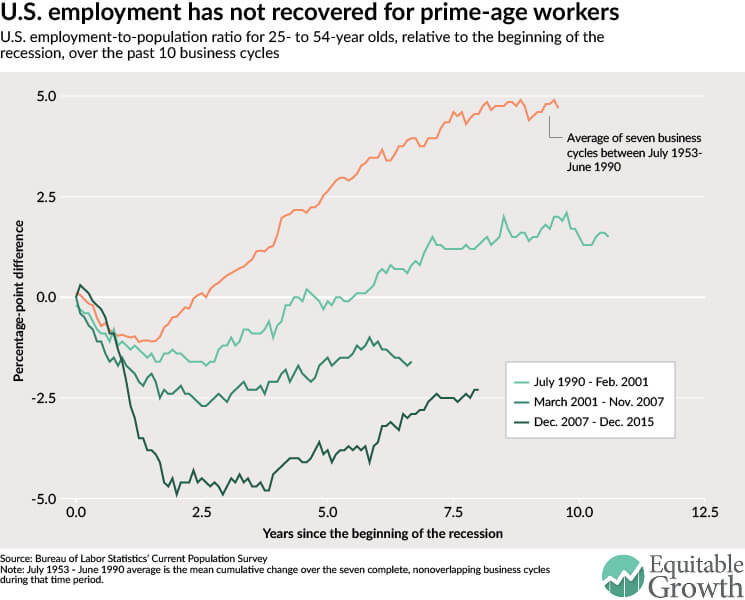Weekend reading: New jobs numbers, #ASSA2016, and more
This is a weekly post we publish on Fridays with links to articles that touch on economic inequality and growth. The first section is a round-up of what Equitable Growth has published this week and the second is work we’re highlighting from elsewhere. We won’t be the first to share these articles, but we hope by taking a look back at the whole week, we can put them in context.
Equitable Growth round-up
Equitable Growth staffers were in San Francisco earlier this week for the annual meeting of the American Economic Association and related associations. The conference featured three days of presentations and panels on topics that cover the wide range of economics research. Check out some of the papers our staff found interesting over the course of the conference.
One of the papers presented at the conference makes a bold claim: The share of income going to labor in the United States has been on the decline since the end of World War II. Not only does the decline start much earlier than previously thought, but the decline can be placed entirely at the feet of intellectual property.
The U.S. jobs report released this morning was definitely positive, with strong job growth and increasing labor force participation. But the continued slow growth in the share of workers ages 25 to 54 with a job is a concerning trend. Ben Zipperer shows just how weak growth in the prime-age employment-to-population ratio has been during this recovery.
Links from around the web
The Allied Social Science Associations conference has hundreds of sessions over the course of three days, so finding one dominant topic can be tough. But there certainly were a few topics that kept popping up across presentations. As Nelson Schwartz reports, one of those topics was economic inequality. [ny times]
Speaking of inequality, a new dataset about the rise of income inequality was unveiled at the conference. The data—constructed by Thomas Piketty, Emmanuel Saez, and Gabriel Zucman—tries to merge data on micro household income and macro national-level data. Jim Tankersley reports on their findings. [wonkblog]
John Maynard Keynes famously predicted that as economic growth continued, workers would be able to work less and less as richer societies allowed for more leisure time. But that prediction hasn’t come to fruition yet. Why aren’t Americans working less? It could be because of rising income inequality, writes Rebecca Rosen. [the atlantic]
Proponents of a flat income tax sometimes state that a flat tax would not only be simpler, but it could also be tweaked not to disproportionately hurt low-income earners. Such a move, however, would require losing quite a bit of government revenue. Michael Linden shows the inherent trade-off of a flat tax. [medium]
New research on student loan data shows that the borrowers who are most likely to default in the United States are those who borrow the least. Why are these borrowers, and not those with the massive burdens we often hear about, defaulting more? According to University of Michigan economist Susan Dynarski, it’s because of earnings. [brookings]
Friday figure

Figure from “El Niño adds to U.S. job growth in December” by Ben Zipperer
